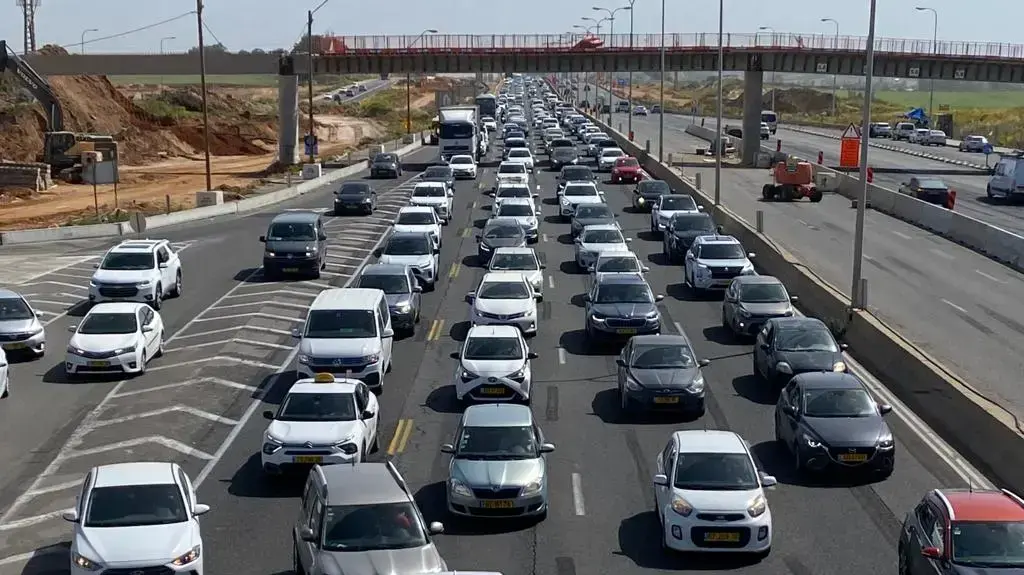Traffic jams on Israel's roads. They will only get longer, but how can you make money from them? (Photo: Flash 90, Avshalom Shouni)
Israel's population is growing rapidly, deepening the gap between the public transportation, energy, and infrastructure needs of Israeli citizens and businesses and the existing supply.
During 2022, for example, Israel's population grew by about 2.2% to about 9.7 million residents, with only 62% of that growth due to natural growth, and the rest (38%) as a result of aliyah to Israel – mainly immigrants from Russia and Ukraine (80% of all immigrants in 2022). This is according to the Central Bureau of Statistics.
The number of businesses also increased, and as of the first 11 months of 2022, about 142,1 new VAT dealers were opened, which is about 119% more than the number of new VAT dealers in 2021, which stood at about 64,9.
The activity and needs of existing businesses and companies also increased, raising accordingly the demand for infrastructure, energy, transportation and public transportation, alongside the natural increase in demand as a result of population growth and the number of businesses.
An economic review by the Department of Budget Supervision at the Knesset Research and Information Center on the Israeli electricity sector, for example, showed that the lowest forecast for electricity demand in 2030 is about 97.2 billion kilowatt-hours (Bank of Israel forecast), and the average forecast is 100.4 billion kWh (IEC forecast), representing an increase of about 45% and 49%, respectively, compared with economic demand in 2019.
And while the state's incompetence leads us to grit our teeth while waiting for the bus, the release of traffic jams on the way to work, or the experience of a planned power outage (especially in the central region), there are also those who benefit from it – investors.
You can take a nap on the train – and you can just invest in it (Photo: ShutterStock)
Energy of success
One of the largest Israeli funds investing in the transportation, energy and infrastructure sectors is the public Generation Capital, which is traded on the Tel Aviv Stock Exchange at a value of NIS 959 million, after its share price jumped by about 6% as of the end of the trading day when it reported its financial results for the first quarter of 2023.
The fund's revenues amounted to NIS 303.6 million for the reporting period, representing an increase of 139% compared with its revenues in Q127 40, which amounted to NIS 3 million.
Most of the increase was attributed to changes in the value of the fund's investments in companies it holds (see table), which increased by about 5% and is currently estimated at NIS 2023.2 billion as of the end of March 5, compared with NIS 203.1 billion in the corresponding period last year.
Thanks to the dividends received from these companies, and the repayments of owners' loans it received from them, the fund's net profit jumped to NIS 2023.147 million in the first quarter of 4 – an increase of about 82.1% compared with NIS 2023.2022 million profit in the first quarter of 73.
Most of the high growth in the fund's holdings occurred in the transportation and energy sectors, which received a strong boost in 12 due to increasing and streamlining the activities of the companies held.
In the field of transportation, for example, Generation Capital is a controlling shareholder (935.2022%) in Bon Tor, which owns the public transport company Metropoline and the importer of buses and shuttle vehicles BG Motors (mainly Mercedes), which also imports electric buses, minibuses and trucks branded Gree and Karasan.
Metropolis brought in NIS 13 million in 331, representing a 6% increase over its revenues a year earlier, alongside revenues of NIS 34.5 million for the same period in the transportation sector – an increase of 10.78% compared to the previous year.
In addition, the fund holds about 59% of the shares of the British passenger and freight train leasing company Porterbrook Holding, which has been active for decades and is considered one of the most stable companies in Europe.
In the energy sector, the fund is a controlling shareholder (50.25%) in the public solar energy company Solgreen. This is the only activity that showed a decline in value, as of the reporting period (but has since doubled up!).
In addition to its holding in Solgreen, the fund also holds, inter alia, half (5%) of the shares of Rafak Energy, a little more than a quarter (33.33%) of the shares of the pumped energy facility PSP Investments in Ma'ale Gilboa, and a third (<>.<>%) of the shares of each of the following natural gas distribution companies: Negev Natural Gas, Natural Gas South, Negev Gas, which have exclusive licenses for the construction and operation of a low-pressure natural gas distribution network in the Negev and the South.
More in Walla!
The Greek island that Israelis have not yet discovered - a paradise with 100 beaches
Contributed by Ayala Travel
Generation Capital's investments and the returns received from them in the first quarter of 2023 (Photo: Walla! system, none)
Release the cap
The fund's activities focus on areas such as infrastructure, energy and transportation, which are considered stable and in strong demand, and the return achieved by Bon Tor and Rafak Energy surprised the market positively, which drove the fund's share price upward.
Past investments are already beginning to bear fruit and the fund reports an average annual return of 26% from its inception, with part of the value creation backed by transactions with third parties in assets.
One of the anchors for the return is its holding in half (50%) of the shares of the storage and logistics company Friedenson-Generation, which has established logistics centers near the seaports in Ashdod and Haifa, and provides cargo storage services. and Water, Wastewater and Environment Company GES, in which it is a controlling shareholder (80.1%).
It should be noted that the company aims to empower the companies held, and as of the end of the first quarter of 2023, the cash balance in its coffers stood at NIS 253.2 million, compared with NIS 72.6 million in the corresponding period last year.
Erez Balsha, co-founder and CEO of Generation Capital, told Walla! "We have always surfaced the existing and expected shortages in infrastructure, energy and transportation. After all, every Israeli citizen does not see an option that he will not have electricity, water or transportation available.
But the growth that the companies we have invested in are experiencing is not only as a result of increased demand, but also from improved operations and profitability, among other things, by using shared infrastructure.
When we entered Metropolis in 2018, for example, it had 2 clusters (Sharon-Holon and Negev) and it was a company of about 500-600 buses, and today it has 4 clusters (Hasharon and Ono-Elad were added) and it is a company of about 1,200 buses, and after the establishment of the new clusters we will reach about 1900 buses.
We also make use of electric buses that we import, and to my delight we are also experiencing a positive migration of drivers to Metropolis, which in performance and efficiency indices shows improvement and has become a large, profitable and stable company.
The field of student and employee transportation has also received a burst of renewal in the past year, when student demand has remained stiff when looking at the overall market, but employee transportation has strengthened. Proper work and management have made Bon Tor the largest company, by far, in the field of private transportation.
And in general, when we examine the transportation sector in general and the public transportation sector in particular, we understand why it is growing and will continue to grow. After all, traffic jams will not disappear, but will only increase.
For example, there was a time when they renovated all the roads in the Galilee and the south, but it was clear that the market would switch to public transportation because they would not be able to accommodate the number of cars. We are already in the world of smart transportation, one that will provide shuttles within neighborhoods, and we are trying to develop, together with the Ministry of Transport, a holistic map."
Yossi Singer and Erez Balsha, Generation Capital. Redirecting investments to points where Israel is experiencing a lack of infrastructure (Photo: Eyal Tuag)
Coming soon: Power outages
Balsha also refers to the growing demand for energy: "Regarding our holdings in the British company Porterbrook, it was done because it was important for us to integrate another business that is very stable, flow-forward and diversified to the world. Our stake in the company yields about £8 million a year in dividend, like clockwork, and it is worth noting that this is a company that received a five-star rating of ESG and is one of the most prestigious in Europe.
Our entry into the energy world was also done with the growing demand and lack of needs in mind, and the government's goals for green energy are well known, as is the growing demand for electricity.
In 2024, which is only a few months away, electricity shortages and power outages are already expected, and already today the demand for electricity is very high. But Rafak Energy benefits from this and is now selling on a large scale to the electricity grid.
When they entered Rafak it had zero megawatts, and today it has over 1 gigawatt, including 10 production sites and 7 power plants. Rafak owns plant plants located in various plants such as Tnuva and desalination plants, and we are benefiting from the high demand and are well prepared for the market model transformation from January 1, 2024 (green energy suppliers will be able to sell electricity directly to consumers as part of the electricity reform).
Solegreen did show a decline in our portfolio compared to the rest, after undergoing a jolt when it discovered the wrong investment it had made in the US, but it was cleaned up and the bleeding stopped.
This led to a significant drop in the company's shares, but at the end of the day it still owns 11 solar fields in Israel, some of which are under construction and some of which will be built in the coming months. Alongside a NIS 900 million battery storage project, and more.
We are at a time when investment in infrastructure has also become very attractive compared to other alternatives such as real estate. Office real estate, for example, is experiencing depletion and falling prices, while infrastructure remains fertile ground for significant growth."
- money
- All articles
Tags
- Traffic
- Power outages
- Infrastructure
- energy








